Related Research Articles

Simón José Antonio de la Santísima Trinidad Bolívar y Ponte Palacios y Blanco, also colloquially as El Libertador, or Liberator of America, was a Venezuelan military and political leader who led what are currently the countries of Colombia, Venezuela, Ecuador, Panama, Peru, and Bolivia to independence from the Spanish Empire.

José Antonio Páez Herrera was a Venezuelan leader who fought against the Spanish Crown for Simón Bolívar during the Venezuelan War of Independence. He later led Venezuela's independence from Gran Colombia.

The military and political career of Simón Bolívar, which included both formal service in the armies of various revolutionary regimes and actions organized by himself or in collaboration with other exiled patriot leaders during the years from 1811 to 1830, was an important element in the success of the independence wars in South America. Given the unstable political climate during these years, Bolívar and other patriot leaders, such as Santiago Mariño, Manuel Piar, José Francisco Bermúdez and Francisco de Paula Santander often had to go into exile in the Caribbean or nearby areas of Spanish America that at the moment were controlled by those favoring independence, and from there, carry on the struggle. These wars resulted in the creation of several South American states out of the former Spanish colonies, the currently existing Venezuela, Colombia, Ecuador, Peru and Bolivia, and the now defunct Gran Colombia.

The Venezuelan War of Independence was one of the Spanish American wars of independence of the early nineteenth century, when independence movements in Latin America fought against rule by the Spanish Empire, emboldened by Spain's troubles in the Napoleonic Wars.

Bolívar's campaign to liberate New Granada of 1819-1820 was part of the Colombian and Venezuelan wars of independence and was one of the many military campaigns fought by Simón Bolívar. Bolívar's victory in New Granada secured the eventual independence of northern South America. It provided Bolívar with the economic and human resources to complete his victory over the Spanish in Venezuela and Colombia. Bolívar's attack on New Granada is considered one of the most daring in military history, compared by contemporaries and some historians to Napoleon's crossing of the Alps in 1800 and José San Martín's Crossing of the Andes in 1817.

Cúcuta, officially San José de Cúcuta, is a Colombian municipality, capital of the department of Norte de Santander and nucleus of the Metropolitan Area of Cúcuta. The city is located in the homonymous valley, at the foot of the Eastern Ranges of the Colombian Andes, on the border with Venezuela. It comprises an area of approximately 1119 km2, with an urban area of 64 km2 and a rural area of 1055 km2. The city has a population of 777,106 inhabitants, which makes it the most populous municipality in the department and the sixth most populous municipality in the country. Similarly, its metropolitan area has an approximate population of 1,046,347.
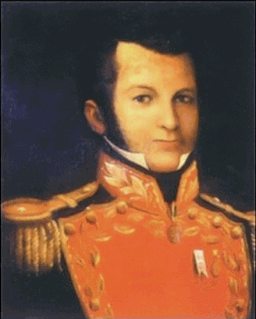
Antonio Vicente Miguel Valero de Bernabé Pacheco, a.k.a. The Liberator from Puerto Rico, was a Puerto Rican military leader. Trained in Spain, he fought with the Spanish Army to expel the French leader, Napoleon, from Spain and was promoted to colonel during these years. A variant of his name, Manuel Antonio Valero, has been adopted by some historians, but it is not present in official documentation nor was it used by him.
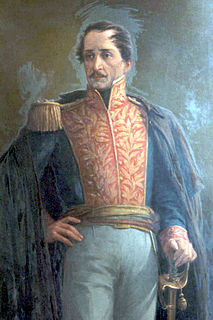
Francisco José de Paula Santander y Omaña, was a Colombian military and political leader during the 1810–1819 independence war of the United Provinces of New Granada. He was the acting President of Gran Colombia between 1819 and 1826, and later elected by Congress as the President of the Republic of New Granada between 1832 and 1837. Santander came to be known as "The Man of the Laws".

Antonio Amador José de Nariño y Álvarez del Casal was a Colombian ideological precursor of the independence movement in New Granada as well as one of its early political and military leaders.
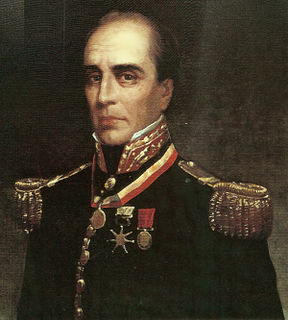
Rafael José Urdaneta y Farías was a Venezuelan General and hero of the Spanish American wars of independence. He served as President of Gran Colombia from 1830 until 1831. He was an ardent supporter of Simón Bolívar and one of his most trusted and loyal allies.

The Admirable Campaign was a military action led by Simón Bolívar in which the provinces of Mérida, Barinas, Trujillo and Caracas were conquered by the Patriots. Its objective was to free Venezuela from Spanish control, which was accomplished in conjunction with Santiago Mariño's simultaneous campaign in the east.
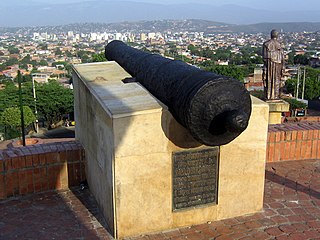
The Battle of Cúcuta was a military conflict in the Spanish American wars of independence fought on February 28, 1813 between the pro-independence forces led by Simón Bolívar and Spanish royalist troops under General Ramón Correa at the town of Cúcuta, in present-day Colombia, close to the border with Venezuela. Bolivar was victorious. The battle gained him much support and immediately preceded his march into Venezuela, later dubbed the Admirable Campaign.

Antonio Ricaurte was a patriot of the Independence of Colombia and Venezuela and captain of Bolívar's army. He is remembered as the martyr of the Battle of San Mateo, where, in a heroic action, he blasted an enemy stronghold by immolating himself.

Gran Colombia, or Greater Colombia, officially the Republic of Colombia, was a state that encompassed much of northern South America and part of southern Central America from 1819 to 1831. It included present-day Colombia, mainland Ecuador, Panama, and Venezuela, along with parts of northern Peru and northwestern Brazil. The terms Gran Colombia and Greater Colombia are used historiographically to distinguish it from the current Republic of Colombia, which is also the official name of the former state.

The constitutional history of Colombia is the process of formation and evolution of the different constitutions that Colombia has had since its formation.

North Santander is a department of Northeastern Colombia. It is in the north of the country, bordering Venezuela. Its capital is Cúcuta, one of the country's major cities.

Víctor Ramón Navarro Serrano, under the alias of Megateo, was a Colombian guerrilla and drug dealer. He belonged to the Popular Liberation Army rebel group.
Juan José Reyes-Patria Escobar (1785–1872) was a Colombian Independence War General.
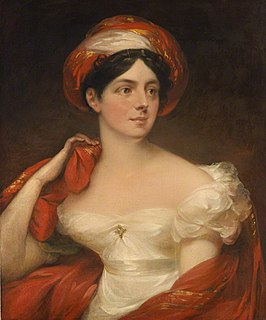
Mary Courthope English, also commonly remembered as Mary Ballard, Mary Greenup and the Belle of Bogota, was an Anglo-Colombian adventurer, landowner, trade representative, farmer and businesswoman in Colombia.

María Concepción Loperena de Fernández de Castro was a Colombian independence activist and patriot who supported the armies of Simón Bolívar in the independence of Valledupar. She was also an abolitionist who freed hundreds of slaves on her properties in Becerril and La Jagua de Ibirico.